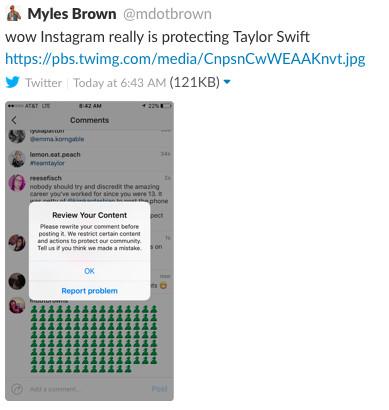Perhaps you’ve heard the news: Taylor Swift and Kimye are engaged in a very entertaining feud involving the most amazing (and potentially illegal!) Snapchat video of all time. I will spare you the details, which are likely unavoidable for anyone with an internet connection at this point. The bottom line is that Swift has been caught in a lie, and it is cause for celebration for those who have long suspected that, well, Swift is a dang liar. On Twitter and Facebook, people lauded the exposure with a flurry of Kardashian tea-sipping GIFs and the hashtag #KimExposedTaylorParty. On Instagram, some Team Kimye members attempted to flood Swift’s comments with the snake emoji to indicate that, alongside being a self-proclaimed cat lady, rampant baker, and one-piece swimsuit connoisseur, Swift is also a cunning media manipulator.
However, it seems that not all of those emoji bombs made it through. As journalist Myles Brown revealed in a tweeted screenshot Monday (the tweet has since been deleted but preserved in our Slack history), Instagram blocked at least one attempt to flood the comments with snakes with an alert that read: “Please rewrite your comment before posting it. We restrict certain content and actions to protect our community. Tell us if you think we made a mistake.”

It’s possible that this new form of moderation is connected to a feature that allows businesses to regulate nasty comments on their Instagram pages. (I’ve reached out to Instagram for more information.) Earlier this month, the platform introduced the tool to allow brands or advertisers to block “comments with words or phrases often reported as offensive from appearing” on their posts. At the time, we wondered — worried, actually — that this update would extend to celebrity accounts and the days of emoji-bombing would be over.
The restriction might appear to be part of a catch-all effort to avoid abuse, but if Instagram does eventually totally exclude emoji-bombing on celebrity accounts, it will be a step toward a more boring, sanitized social media environment. One of the most appealing things about following famous people online is that they can’t hide in the money-lined, hermetically sealed bubble they are afforded in the real world. If Kanye West tweets something, he must endure a sexually explicit reply about cucumber masturbation, just like the rest of us. And while some hateful comments definitely count as abuse (which platforms have an essential responsibility to moderate), others fall squarely into the category of criticism.
Emoji-bombing is a solid, nonhateful way to criticize a celebrity. In a world where second-by-second comments flood celebrity accounts, a nonfamous person’s voice is easily lost. Posting a block of colorful characters is one of the few ways people can pledge allegiance for or against a celebrity without spewing profanities. The general public has never had the attention span to scroll through 4,000 plus “cunt”-filled responses to a famous person’s post, but we do appreciate the ability to take the temperature of an online mob’s reaction with a quick glance.
The practice of emoji-bombing is probably best exemplified by the storied Rachel Roy Clap Back of 2016. After Beyoncé dropped Lemonade, Rachel Roy responded with an ill-advised Instagram post, referencing a lyric that referred to Jay Z’s alleged mistress as “Becky with the good hair.” In response, the Beyhive swooped into her comments section and dropped stacks of bee and lemonade emoji on every single photo Roy had ever posted. Roy quickly deleted the photo that set people off, and then made her Instagram account private (it’s since been switched back to public). Fans were vindicated. People chilled out. The whole shebang, aside from being impossible to look away from, was proof that celebrities who make questionable social media decisions are susceptible to the same internet wrath as everyone else. Even the Queen Bee was forced to endure a little emoji-bomba-drama at the peak of her public veganism.
Celebrity may be a business, but celebrities — at least so far as social network definitions are concerned — are still people. If Instagram wants to ensure that famous people remain interesting on its platform, it shouldn’t afford them the same 12-foot-high barbed-wire fence it does the advertisers.